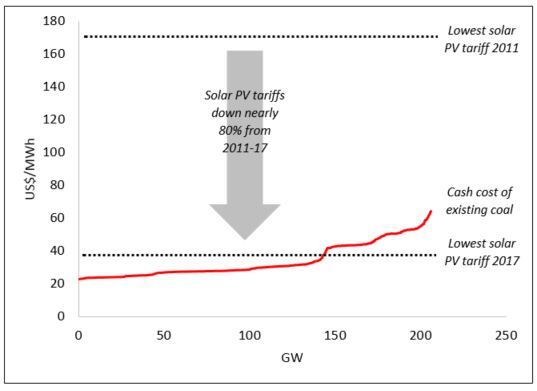
The Trump administration’s decision to pull out of the Paris climate agreement will not end the global effort to limit the effects of climate change. In the immediate time frame — say, Trump’s first term — it will have little effect, and may even spur a backlash as the rest of the world redoubles its commitment to action (China and the European Union have already taken steps to do so). It will, however, slow and impair international diplomacy. The next American government that tries to negotiate on climate change will be handicapped by the suspicion that it won’t abide by its commitments, undercutting American leadership and making it more difficult to secure cooperation from other countries.
The question is, what purpose does this serve? What economic or philosophical policy goal is advanced? The answer is that it satisfies the same elemental partisan tribalism that has allowed Trump to hold together his party.
It is worth recalling the principal argument that Republicans made against the Paris agreement from the outset was that it would have no effect on developing countries like India and China. “And you know what passing those laws would have — what impact it would have on the environment?” insisted Marco Rubio in 2016. “Zero, because China is still going to be polluting and India is still going to be polluting at historic levels … these other countries like India and China are more than making up in carbon emissions for whatever we could possibly cut.”
Why was the right so certain that India and China would continue to ramp up their carbon emissions regardless of what they said in Paris? Because, they insisted, dirty energy was and would remain the best path for them to raise their standard of living, which was and is well below American levels. National Review editor Rich Lowry, writing in December 2015, dismissed plans to steer the developing world onto a cleaner energy path as “a naive belief in the power of global shame over the sheer economic interest of developing countries in getting rich (and lifting countless millions out of poverty) through exploiting cheap energy — you know, the way Western countries have done for a couple of centuries.”
But this analysis has proven incontrovertibly false. Rather than lagging behind their promised targets, India and China are actually surpassing them. According to Climate Action Tracker, India, which had promised to reduce the emissions intensity of its economy by 33–35 percent by 2030, is now on track to reduce it by 42–45 percent by that date. China promised its total emissions would peak by 2030 — an ambitious goal for a rapidly industrializing economy. It is running at least a decade ahead of that goal.
Why are these countries blowing past their targets? Because the cost of zero-emissions energy sources is plunging. In India, solar energy not only costs less than energy from new coal plants, it costs less than energy from existing coal plants:

The virtuous cycle of political will and innovation is proving more potent than expected. As more governments bind themselves to emissions reductions, business creates the technology to meet those goals, which brings down the cost of reducing emissions, which in turn emboldens governments to raise their ambitions further still. The factual predicate upon which the American right based its opposition to Paris has melted away beneath its feet.
Likewise, the scientific basis for the right’s skepticism of the theory of anthropogenic global warming has collapsed. Conservatives used to dismiss the scientific consensus on heat-trapping gases on account of the fact that 1998 saw an anomalously big spike in global temperatures in the midst of an overall warming trend. For years, conservatives would triumphantly point out that there had been no warming since 1998, as if the data from this one year nullified decades’ worth of rising temperatures. In the meantime, 2014, and every year since then, has since exceeded the 1998 record, rendering the old, misleading talking point outright false. But no rethinking has followed on the right. As justifications for inaction are falsified, new ones take their place, while the conclusion remains the same.
++
Liberals used to accuse conservative climate science skeptics of merely shilling for the fossil-fuel industry. Certainly the owners of dirty energy reserves have invested in conservative politics with the aim of protecting their assets, and those investments have borne some fruit. (Trump’s EPA director has in the past literally outsourced his job to oil firms.) But there is far more at work in conservative opposition to decarbonization than the hidden hand of oil and coal; indeed, many fossil-fuel companies prefer the predictability of the Paris agreement to policy that jerks back and forth every time the presidency changes hands between the parties.
The dominant spirit of conservative thought — or, more precisely, verbal gestures that seek to resemble thought — is not even skepticism but a trolling impulse. The aim is not so much to reason toward a policy conservatives would favor as to pierce the liberal claim to the moral high ground.
Here is one representative specimen. Conservative columnist Jamie Weinstein, writing in the Washington Examiner, argues that Democrats cannot actually believe their own rhetoric about the importance of climate change, since their actions did not reflect its urgency when they held power. “Democrats like to claim global warming is the greatest threat the world faces,” writes Weinstein, “but when Obama swept into office in 2009, with liberal majorities in the Senate and the House, this supposedly existential threat was nowhere near the top of the Democrats’ agenda.”
Weinstein’s argument suffers from numerous flaws, each of them fatal. First, as a factual basis, liberals never had close to the 60 Senate votes needed to pass a cap-and-trade bill; during the few months when they had a filibuster-proof supermajority, their caucus contained numerous senators from oil- and coal-producing states, who fervently opposed any emissions limits. Second, Democrats did take significant political risk for the issue, holding a House vote that forced vulnerable Democrats to vote for a bill that stood no realistic chance of passing. They took this dangerous vote with precious little chance of success precisely because they did recognize the world-historical urgency of the problem.
Third, even if Democrats had proceeded cautiously, it’s common for politicians to behave pragmatically even in the face of what they see as moral crises of the highest order. Interventionists in the 1930s who saw Hitler as a dire threat to world peace did not devote all their energy to demanding rearmament. People who see abortion as murder mostly do not act as if they live in a country committing an ongoing holocaust.
Finally, even if none of the above points were true, the question would be, so what? Suppose Democrats undercut their position by refusing to take climate change seriously. What does that tell us about the policy they did carry out under Obama? And, moreover, which element in Weinstein’s chain of reasoning undermines the logic of the scientific consensus of the dangers of greenhouse-gas emissions or policies that are reducing those emissions? Weinstein does not connect his allegations of hypocrisy to any of those conclusions. He simply levies a specious charge and then proceeds immediately to this conclusion: “Rather than condemning the world to a thousand years of darkness, Trump’s decision to scuttle the Paris Agreement will more likely help Democratic politicians raise a few thousand dollars apiece, or more, from their liberal base.”
Nothing he has argued remotely supports Trump’s decision to abandon Paris. It is what Lionel Trilling, describing the intellectual style of the postwar right, called “irritable mental gestures which seek to resemble ideas.” Weinstein points a dismissive finger at the left and dismisses the entire problem of climate change as a cynical pose.
++
I’m highlighting Weinstein’s column not because it’s especially dumb, or especially smart, by the standards of a conservative climate-change polemic. I am highlighting it because it’s close at hand (having run yesterday) and captures the predominant (though not, of course, universal) style of argument on the subject. It contains a defiant refusal to take the policy questions seriously, combined with a gleeful reproach of the urgency with which liberals view the issue. A crude tribalistic impulse overrides any reckoning with the problem. The proximate issue in conservative minds is not climate change itself but the fact that liberals are concerned about all these things. Disintegrating ice shelves, extinctions, or droughts are abstractions.
It is similar to the predominant response to liberal terror over the prospect of handing the most powerful office in the world to an impulsive congenital liar with authoritarian tendencies. Conservatives on the whole devoted less attention to pondering the risks Trump might pose to their own country and party than enjoying the liberal tears.
“Everybody who hates Trump wants him to stay in Paris,” argues conservative activist Grover Norquist. “Everybody who respects him, trusts him, voted for him, wishes for him to succeed, wants him to pull out.” Here is an argument that approaches, even if it does not fully reach, complete self-awareness: The Paris climate agreement is bad because it is supported by people who oppose Trump. Therefore, the opposing position is the correct one.
If the liberal global elites have established a policy architecture to minimize the threat of climate change, weakening that policy architecture is its own reward. There is not much more to it than that.






























